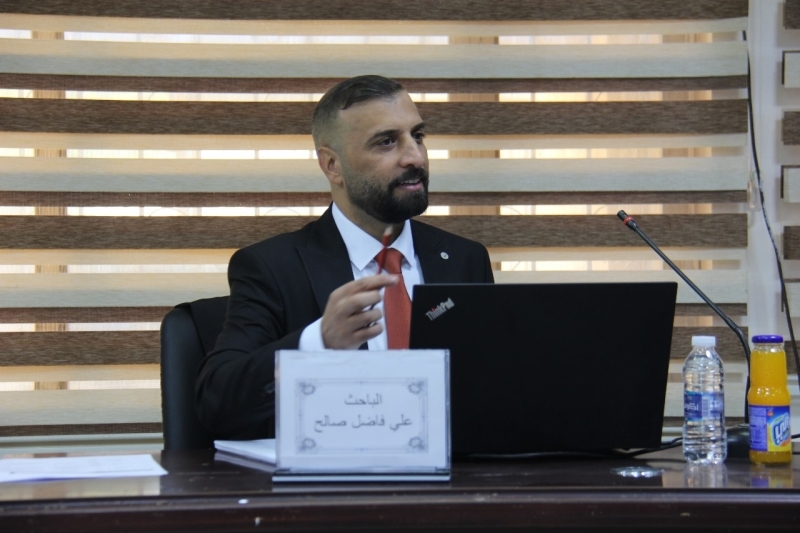
ناقشت رسالة ماجستير في قسم علوم الحاسوب بكلية العلوم في جامعة النهرين، بعنوان “تعزيز نظام توصية خدمة الرعاية الصحية الآمنة باستخدام الحوسبة الضبابية”، قدمها الطالب علي فاضل صالح.
هدفت الدراسة إلى تطوير نظام ذكي لتوصية الأدوية يعتمد على مراحل متعددة لتحليل البيانات وتحسين دقة التوصيات وضمان سرية بيانات المرضى، مما يسهم في دعم القرارات الطبية بشكل فعال وآمن.
تضمنت الدراسة تصميم نموذج يتألف من أربع مراحل رئيسية، شملت المرحلة الأولى معالجة البيانات المستخلصة من مراجعات المرضى لتجهيزها للمعالجة اللاحقة. في المرحلة الثانية، تم تطبيق تقنيات تحليل المشاعر باستخدام نماذج تعلم عميق مثل الشبكات العصبية التلافيفية (CNN)، والذاكرة طويلة المدى (LSTM)، والذاكرة ثنائية الاتجاه (BiLSTM)، بالإضافة إلى أدوات تحليل مشاعر تعتمد على القواعد مثل VADER وTextBlob. استُخدمت الحوسبة الضبابية في المرحلة الثالثة لتحسين كفاءة استهلاك الطاقة وضمان حماية البيانات، بينما ركزت المرحلة الأخيرة على تقديم توصيات دوائية آمنة باستخدام خوارزمية معيار التشفير المتقدم (AES).
توصلت الدراسة إلى أن نموذج الشبكات العصبية التلافيفية (CNN) حقق دقة عالية تجاوزت 90%، حيث بلغ مقياس F1 نحو 0.9300، متفوقاً على النماذج الأخرى مثل LSTM وBiLSTM التي حققت دقة بلغت 0.8784 و0.8814 على التوالي. كما أثبتت خوارزمية AES كفاءتها في حماية البيانات من خلال تحسين جودة التشفير. تعكس النتائج تفوق نماذج التعلم العميق على الأساليب التقليدية، مما يجعل النظام المقترح أداة فعالة ودقيقة لتحسين الرعاية الصحية.
قسم الاعلام والاتصال الحكومي
رئاسة جامعة النهرين
Master’s Thesis at the College of Science Discusses Enhancing Healthcare Recommendation Systems Using Fog Computing
A Master’s thesis in the Department of Computer Science at the College of Science, Al-Nahrain University, titled “Enhancing Secure Healthcare Recommendation Systems Using Fog Computing,” was presented by the student Ali Fadhil Saleh.
The study aimed to develop an intelligent drug recommendation system based on a multi-stage process to analyze data, improve recommendation accuracy, and ensure patient data confidentiality, thereby supporting medical decision-making effectively and securely.
The research introduced a model consisting of four main stages. The first stage involved processing patient review data to prepare it for subsequent analysis. The second stage applied sentiment analysis techniques using deep learning models such as Convolutional Neural Networks (CNN), Long Short-Term Memory (LSTM), and Bidirectional LSTM (BiLSTM), as well as rule-based sentiment analysis tools like VADER and TextBlob. The third stage utilized fog computing to enhance energy efficiency and ensure data protection, while the final stage focused on providing secure drug recommendations using the Advanced Encryption Standard (AES) algorithm.
The findings revealed that the CNN model achieved a high accuracy rate exceeding 90%, with an F1 score of 0.9300, outperforming other models such as LSTM and BiLSTM, which achieved accuracies of 0.8784 and 0.8814, respectively. Additionally, the AES algorithm demonstrated its efficiency in securing data by improving encryption quality. These results highlight the superiority of deep learning models over traditional methods, making the proposed system an effective and accurate tool for improving healthcare services.
Media and Government Communication Department
Al-Nahrain University Presidency
